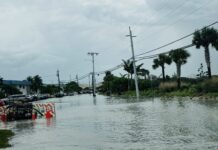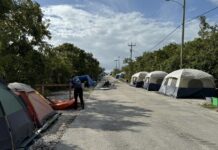
Layton’s doing it. So is Monroe County. Now Marathon has signed on. They have decided to require 3 feet of “freeboard” above base flood elevation for new and redeveloped construction.
What is freeboard? It’s the “cushion” above current base flood elevation as defined by the National Flood Insurance Program (NFIP). Insurance rates are based on where a house sits — under or above — the base flood level; naturally, a ground-level home built below base flood pays a higher rate as it runs a higher risk of flooding in a storm surge.
The Marathon City Council, staff and residents have a lot of questions about the variables that could affect the amount of freeboard. For one, FEMA will release the draft versions of new flood maps this summer, an update of information that is 30 to 40-years old. For another, the City of Marathon has height limitations for construction; if a house has to be higher than base flood, but lower than 37 feet tall, construction options might be seriously curtailed. Finally, there are insurance and construction cost implications for projects that have already been designed or are currently under construction.
Please see next week’s Weekly newspaper for more information about freeboard and flooding.
In other news:
- Councilman Dan Zieg said the Monroe County Land Authority has verbally agreed to research properties within city limits that may qualify for the “less than fee” buy-back program similar to the county’s. Property owners can retire development rights on adjacent lots for a one-time buy out. The program was created to lessen possible lawsuits come 2023 when there are no more new development rights available to property owners.
- The building workshop set for June 4 was canceled. Zieg, and councilmen Luis Gonzales and Steve Cook, said they wanted to wait for a study on impact and permit fees. Councilman Mark Senmartin and Mayor John Bartus objected, saying the workshop was to hear from contractors and set policy, not prices.
- Currently the city has about 60 occupied temporary trailers or recreational vehicles. About half of those have a permit. City staff estimates there are about 18 occupied trailers living in front of a storm-destroyed home that have made no demonstrable progress in rebuilding.
“We know that some people are renting trailers or RVs. We do know that’s happening and it’s wrong. If you’ve identified those 18, then action needs to be taken,” Senmartin said.
- The city has re-prioritized its wastewater plan. The city’s Dan Saus told council that a re-pumping station to direct flows from plant No. 3 to No. 4 is necessary. The council authorized a $110,000 contract for design and engineering services. Saus said he is also working to identify the source of the high flow rates, above and beyond that generated by the now open Isla Bella resort.
- The state Department of Transportation will begin work on the intersection of U.S.1 and Aviation Boulevard in August.
- The council denied a conditional use and developer’s agreement for the construction of 10 affordable units at the corner of 15th Street and U.S.1, citing an “upzoning” request of two more units than it is currently zoned for, among other issues. The vote to deny was 3-2, with Bartus and Councilman Steve Cook objecting.
- The council approved the purchase of a 600KW generator on a trailer for $208,785 and a Ford F250 for the utility department for $36,589.
PERIL OF FLOOD
On May 21, 2015, then-Gov. Rick Scott signed into law Florida Senate Bill 1094, “An Act relating to the peril of flood.” SB 1094 requires local governments to consider future flood risk from storm surge and sea level rise in certain portions of its comprehensive plans.


























